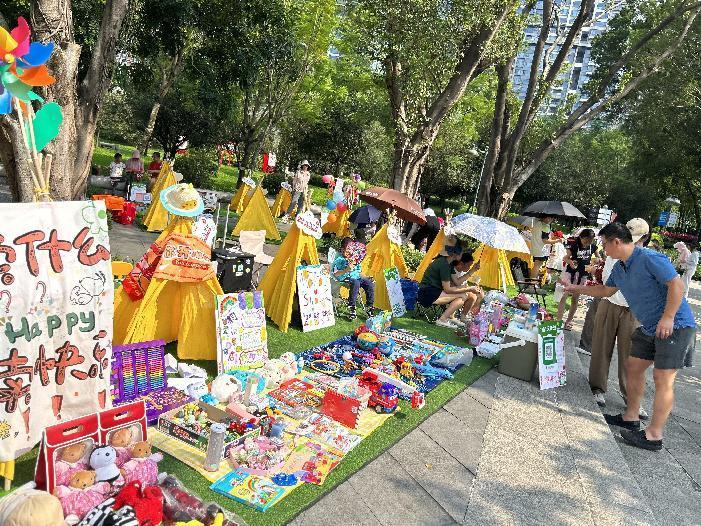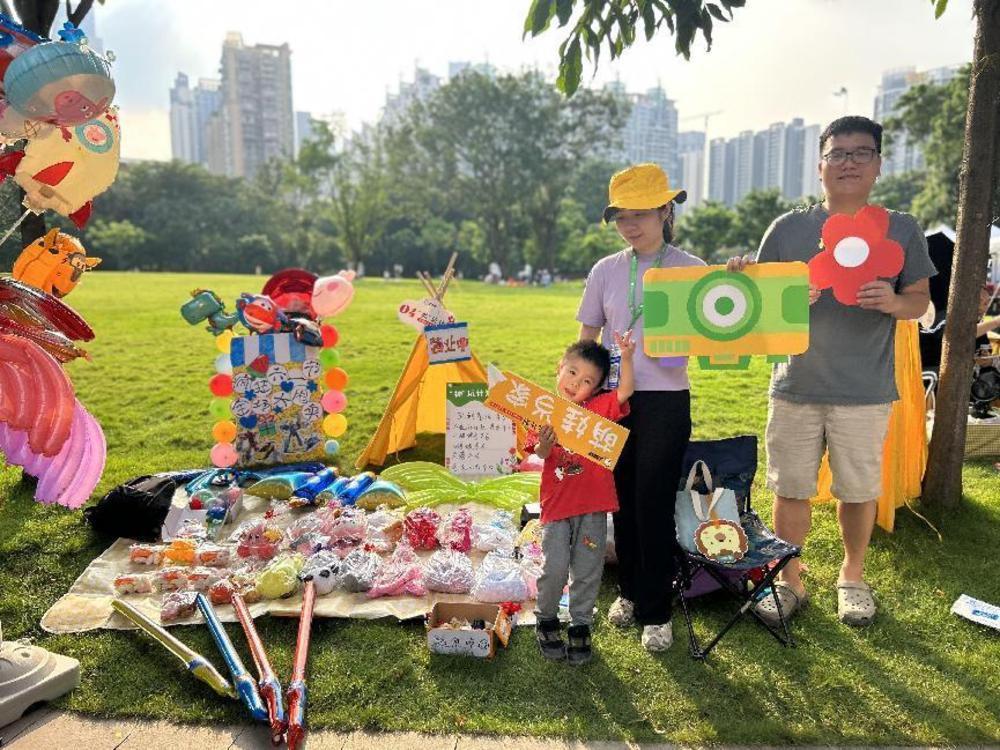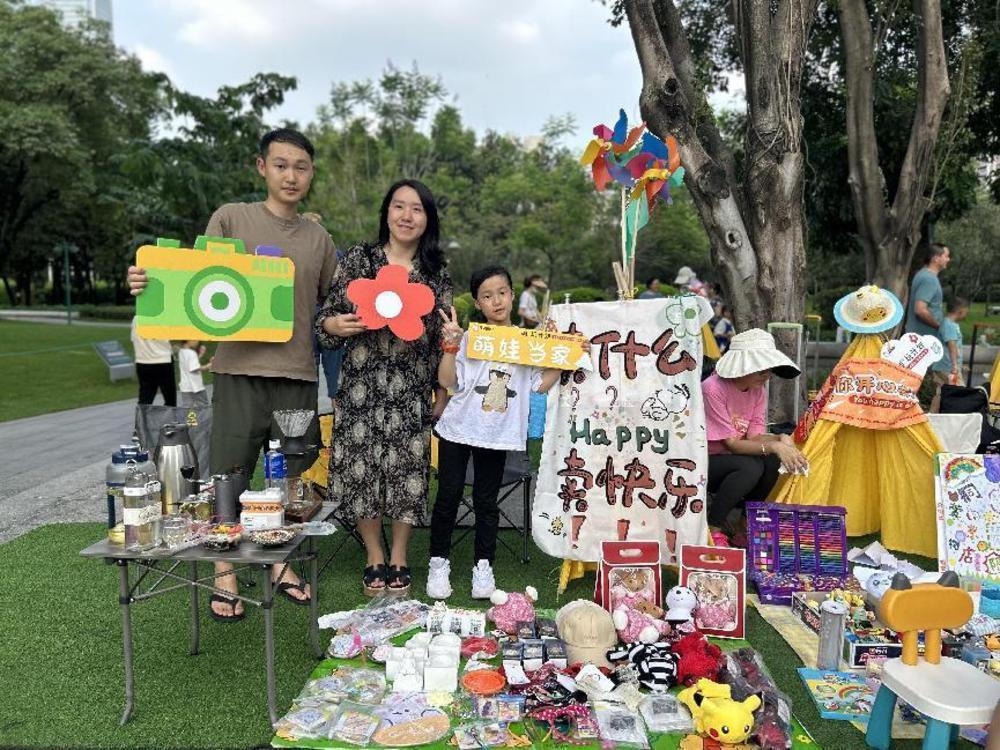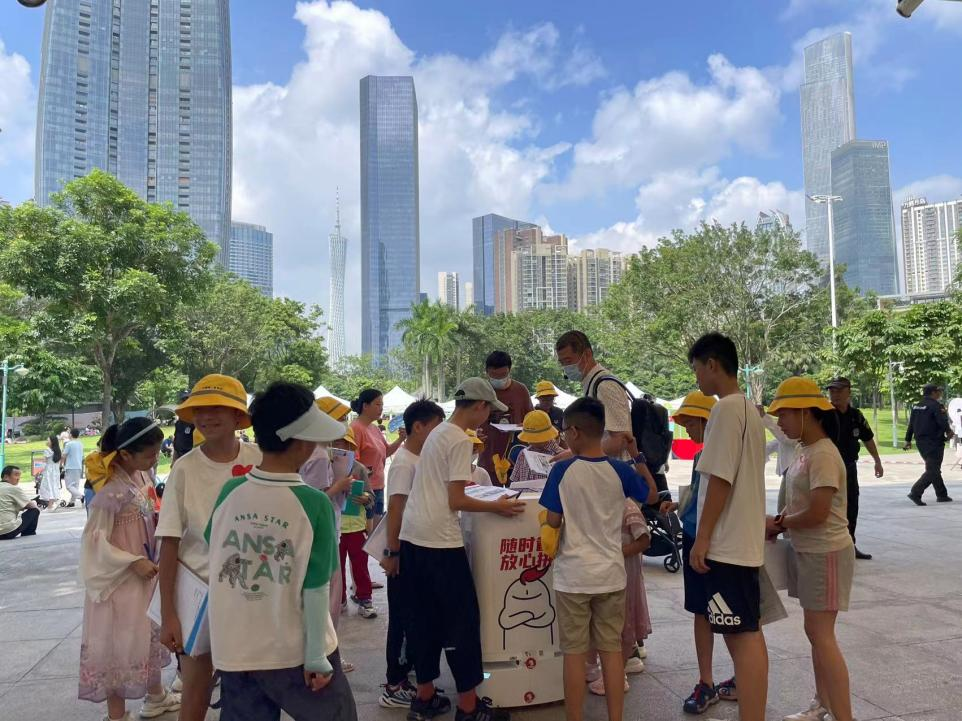"Hello, come and look at my good stuff!" On May 28th, a group of "little tourists" gathered in Guangzhou Pearl River Park, making the "sale" in fluent English. On the spot, the shouting of "Big sale!" could be heard everywhere.
This English-speaking bazaar, also known as "Children's Canton Fair", is one of Pearl River Park's "stall" plans and sci-tech activities for celebrating Children's Day. Sixty families have formed separate teams to participate in the activity, achieving both parent-child interaction and bilingual education through setting up stalls, educational camping and shopping with smart robots.

On the lawn, the children have set up colorful tents and cardboard signs with the information of the goods written on them in English, from funny candies, teddy bears, and model cars to hand-painted pictures. They have shown their familiarity with "sales exhibition" by skillfully soliciting customers and maintaining their stalls.
Besides the little stall owners, there were also the little "buyers". To promote the virtue of frugality, every "product" in the bazaar was priced and sold all by the children themselves.
In fact, "bazaars" are rather common all around the world. From the fancy flea market in foreign countries, the "market day" for selling vegetables and fruits in China, to the world-renowned "Canton Fair", all are essentially social venues for people to get together, socialize and trade, during which they can also exchange valuable information and experience the changes in supply and demand.
Each person should buy ten yuan worth of stuff to get a "pass", according to the set of "rules" of the activity, said the manager. "Through the interesting transaction, kids will gradually understand the principle of equivalent exchange. And we have noticed that they are all trying hard to buy and sell in English. During this process, we also try to teach them knowledge in finance and foreign trade bilingually, so that they can be more in line with the world. We also hope that their IQ and EQ can both be improved in a happy childhood."

In addition to the park bazaar, there was also a "walking English class", in which the children could study while strolling along the greenway in the park and embracing nature. "What kind of things go out of the country to the world?" asked the teacher. "Panda!" "Clothes and shoes." "Mobile phone." On the small bridge above the running river, the children scrambled to answer.
In the upcoming days, there will be a series of fantastic activities kicking off in the Pearl River Park, including a parents-child eco-fashion competition, a public lecture on the intangible cultural heritage dragon and lion dance and a class for paper-folding technique, while the Bay Area Reading Room will also be opened. Citizens and tourists can come to enjoy a "culture feast" on a hot summer's day.
萌娃露营新玩法!公园里的“英语集市”有创意又有内涵
"Hello, come and look at my good stuff!" 5月28日,广州珠江公园里迎来了一群“小游客”,他们用熟练的英语口语,完成一笔又一笔“买卖”,现场直呼:"Big sale!"
这场被称为“童玩广交会”的英语集市,是珠江公园六一节“摊”玩计划与科技童乐活动的趣味一幕。据了解,活动吸引了60组家庭“组团”参加,借助摊位市集、露营研学、机器人智能购物等多种形式,让亲子家庭与双语教学开启“双向奔赴”。

趣玩糖果、小熊玩偶、汽车模型、手绘画作……草地上,小朋友们搭起了五颜六色的帐篷,将要出售的商品信息用英文写在纸板招牌上,一边招揽客人、一边摆弄摊位,熟练地开启“展销模式”。
除了用心“营业”的小摊主,一部分小朋友也扮演起“买手”的角色。据悉,为充分发扬勤俭节约的美德,集市里的每样“商品”都由孩子们自主定价、自主销售。
事实上,“集市”的概念在全世界并不罕见。无论是国外新奇的跳蚤市场,还是国内老百姓售卖蔬果的“圩日”,抑或是举世瞩目的“广交会”,本质上都是人们聚集在一起,开展社交、交易的交际场。在此过程中,人们互相传递有价值的信息,感受供需的变化。
“在乐趣无穷的交易中,孩子们逐渐懂得等价交换的概念。”活动负责人告诉记者,该活动制定了一套“规则”,即每个人总共需购买满10元,方能达到“及格”的标准。“我们看到,每个孩子都努力地尝试用英语完成买和卖。在这个过程中我们同步灌输财经、外贸的双语知识,让孩子在‘谈订单’中与国际接轨,充分锻炼智商与情商,收获快乐童年。”

除了妙趣横生的公园集市,孩子们还沿着珠江公园的绿荫小道边学边游,在拥抱大自然中上一堂“行走的英语课”。"What kind of things go out of the country to the world?""Panda!""Clothes and shoes.""Mobile phone."小桥流水之上,指导老师向孩子们提问,争先恐后地抢答让课堂感染力十足。
据了解,近期,珠江公园还将举办环保时装亲子大赛、非遗龙狮公益讲堂、湾区书屋、折纸工艺课堂等缤纷活动,市民游客可在炎炎夏日中前往公园绿地,享受文化“消暑大餐”。
文丨羊城晚报全媒体记者 符畅 实习生 卢佳圳 通讯员 黄颖玲
图丨受访者提供
翻译丨洪婷
责编丨古司祺









